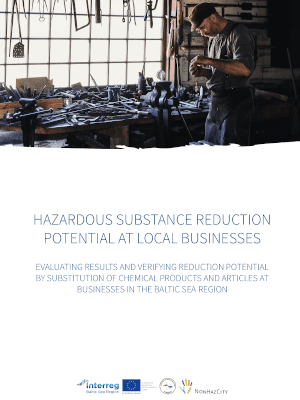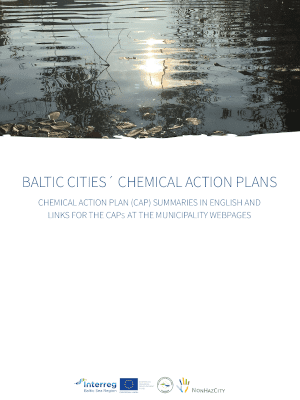NonHazCity
Small scale emitters with big impact
Industrial wastewaters, municipal sewage and stormwater are the source of hazardous substances and pollutants entering the Baltic Sea waters. Although emissions from industrial sources are formally regulated, emissions coming from small-scale businesses or households usually are not. However, in cases of substances like phthalates, bisphenol A, alkylphenols and PFAS smaller sources account for 50% of emissions in the region.
So far, the exact emitters have been not identified because of low concentrations of the substances of concern. They have not been addressed either due to the high number of emitters. Consequently, people running small-scale businesses or households have little knowledge of which chemical products to select and which to avoid in order to protect both their own health and the environment.
Lacking tools to tackle emissions from small-scale emitters
Another challenge is related to the municipal wastewater treatment facilities, which are unable to effectively treat the pollution coming from small-scale businesses and households. People responsible for wastewater management in municipalities need to learn about new techniques to reduce emissions of hazardous substances and other pollutants that cannot be reached by traditional water treatment and enforcement techniques.
Budgets
in numbers
-
3.54MillionTotal
-
2.80MillionErdf
-
0.00MillionEni + Russia
-
0.00MillionNorway
Achievements
Chemical plans in action
Based on scientific studies showing frequent occurrence of phthalates, bisphenol A, alkylphenols and PFAS in wastewater, sewage sludge and stormwater, the project encouraged nine municipalities in Estonia, Finland, Germany, Latvia, Lithuania and Poland to develop their own chemical plans. This way representatives of municipalities and wastewater treatment plants, owners of local businesses and inhabitants received a practical set of tools to reduce emissions.
In Gdansk (Poland) and Riga (Latvia), the chemical action plans became standalone strategies, whereas the Riga City Council has introduced a new full-time staff position of chemical coordinator to monitor the implementation of its plan.
Kaunas district and Šilalė (Lithuania) incorporated their new chemical action plans into existing municipal development plans. Kaunas district municipality is now prepared to train its employees on procuring products that do not contain hazardous substances.
Pärnu (Estonia) adds its chemical action plan to its city waste plan and is running a campaign among residents and small businesses to educate them on hazardous substances in plastic food containers and household appliances.
The chemical action plan of Turku (Finland) was added to the existing Baltic Sea Challenge Action Plan, which covers Helsinki as well as Turku. Finally, Stockholm and Västerås (Sweden) updated their existing chemical action plans as a result of the project.
The project partners reached 200 additional municipalities to teach them about reducing the amounts of hazardous substances entering the wastewater, sewage sludge and stormwater.
Small businesses can make a big difference
The project has improved knowledge on the potential for hazardous substance reduction in businesses. Owners of 40 companies received tailor-made advice on how to improve their handling of hazardous substances. This included, for example, an end-of-life vehicle management company in Turku, private kindergartens in Riga, and an IT company in Gdansk. In addition, 340 companies and business associations and chambers of commerce attended training courses and more than 3,500 received information from the project. Among these were hotels, hairdressers, cleaning services, car repair workshops, laundry services, the construction and woodworking industry, healthcare services, and, in general, offices.
The home project
50 private households in ten municipalities in Poland, Germany, Estonia, Latvia, Sweden, Lithuania and Belarus were checked on hazardous substances, for example in cleaning agents, toiletries, kitchenware and toys. The households received information about the products in their home and advice on how to reduce the amount of hazardous substances used. During a second home visit, the households showed what changes they had made as a result, for example they had exchanged kitchenware such as non-stick pans and plastic food containers as well as reduced the number of detergents. Volunteer households in Gdansk provided urine samples before and after these behavioural changes: after avoiding certain plastic products, there was a decrease in concentrations of bisphenol A, phthalates and nonylphenol. The participants claim to reported an increase in awareness and confidence about hazardous substances after taking part in the household check.
Less hazardous substances in the future
With EUR 2.8 million support from the European Union, the Interreg project NonHazCity has increased knowledge and pushed for real actions towards reducing hazardous substances in local municipal administrations, businesses and households. In its follow-up project, NonHazCity 2, the project partners, among other things, will monitor the municipalities’ implementation of their chemical action plans and further train public authorities in chemicals-smart procurement.
The project’s success in tackling the challenge that goes beyond borders was already replicated by two municipalities in Belarus, Ivyje and Vilejka, thanks to Swedish funding. Now, two Russian organisations are also getting involved in NonHazCity 2 in order to transfer good practice to the municipality of St. Petersburg.
Outputs
Report on SMEs' potential to reduce hazardous substances

Municipal chemical action plans

Project Stories
-
31.05.2021
How NonHazCity paves the way for a tox-free Europe
From toothpaste to toys, hazardous chemicals are everywhere around us. Read about the Interreg project NonHazCity and its #MadeWithInterreg solutions for a greener and healthier life. Together with another project from the North Sea region, Sullied Sediments, they show how dedicated people working across borders are putting the EU Green Deal into practice.Read full story -
23.09.2020
Interreg projects from the region gain EU wide visibility
Two Interreg Baltic Sea Region projects - EcoDesign Circle and NonHazCity - have reached the finals of two EU wide campaigns: RegioStars Awards 2020 and the Interact Project Slam. Both projects showcase how cooperation in an Interreg project actively contributes to a greener Europe.Read full story -
03.09.2020
“We want all citizens in Europe to become tox-free”
The NonHazCity projects are a great example of how Europeans with smart ideas successfully cooperate to turn good solutions into common practice. Environmentalists, public officials and researchers from eight countries demonstrate how we can reduce the amounts of hazardous substances that enter the environment from sources that cannot be controlled by traditional water treatment, e.g. offices, schools, recreational facilities and businesses. Read here about the household check – a unique tool to reach out to private households and to initiate better consumption decisions. The concerted approach of NonHazCity is innovative and far-reachig which is why the projects are flagships of the EU Strategy for the Baltic Sea Region.Read full story -
24.10.2019
What municipalities and cities get out of Interreg projects
Interreg is all about the regional development of municipalities and cities. Every tenth project partner in projects funded by Interreg Baltic Sea Region is a local public authority, i.e. an institution involved in governing a municipality or city. But why exactly do they participate in cooperation projects?Read full story -
17.01.2019
NonHaz office!?
The NonHazCity project has compiled knowledge about hazardous substances in everyday life and about how to reduce their consumption. Campaigns were run among consumers, companies and municipal administrations in nine cities around the Baltic Sea: Pärnu, Turku, Gdansk, Riga, Hamburg, Västerås, Stockholm, Silale and Kaunas. One site visit even led the project to the office of the Managing Authority/Joint Secretariat of Interreg Baltic Sea Region.Read full story
Partners
Municipality of Stockholm
- TownStockholm
- RegionStockholms län
- CountrySweden
- RepresentativeTonie Wickman
- Phone
- E-Mail
- Web
City of Västerås
- TownVästerås
- RegionVästmanlands län
- CountrySweden
- RepresentativeCaroline Söderlund
- Phone
- E-Mail
- Web
Swedish University of Agricultural Sciences
- TownUppsala
- RegionUppsala län
- CountrySweden
- RepresentativeKarin Wiberg
- Phone
- E-Mail
- Web
Turku University of Applied Sciences
- TownTurku
- RegionVarsinais-Suomi
- CountryFinland
- RepresentativePiia Leskinen
- Phone
- E-Mail
- Web
Pärnu City Government
- TownPärnu
- RegionLääne-Eesti
- CountryEstonia
- RepresentativeSigrit Kasemets
- Phone
- E-Mail
- Web
Baltic Environmental Forum Estonia
- TownTallinn
- RegionPõhja-Eesti
- CountryEstonia
- RepresentativeHeli Nõmmsalu
- Phone
- E-Mail
- Web
Riga city
- TownRiga
- RegionRīga
- CountryLatvia
- RepresentativeJānis Švinskis
- Phone
- E-Mail
- Web
Baltic Environmental Forum Latvia
- TownRiga
- RegionRīga
- CountryLatvia
- RepresentativeValters Toropovs
- Phone
- E-Mail
- Web
University of Gdansk
- TownGdańsk
- RegionGdański
- CountryPoland
- RepresentativeMagda Caban
- Phone
- E-Mail
- Web
Municipality of Gdansk
- TownGdańsk
- RegionGdański
- CountryPoland
- RepresentativeMaciej Lorek
- Phone
- E-Mail
- Web
Gdansk Water Utilities Ltd.
- TownGdansk
- RegionGdański
- CountryPoland
- RepresentativeMarek Swinarski
- Phone
- E-Mail
- Web
Baltic Environmental Forum Lithuania
- TownVilnius
- RegionVilniaus apskritis
- CountryLithuania
- RepresentativeLaura Stance
- Phone
- E-Mail
- Web
Environmental Protection Department under the Ministry of Environment
- TownKlaipėda
- RegionKlaipėdos apskritis
- CountryLithuania
- RepresentativeValda Kvederytė-Petkuvienė
- Phone
- E-Mail
- Web
Institute of Applied Ecology
- TownNeu Broderstorf
- RegionRostock, Kreisfreie Stadt
- CountryGermany
- RepresentativeJens Gercken
- Phone
- E-Mail
- Web
Baltic Environmental Forum Germany
- TownHamburg
- RegionHamburg
- CountryGermany
- RepresentativeMartin Krekeler
- Phone
- E-Mail
- Web
Kaunas District Municipality
- TownKaunas
- RegionKauno apskritis
- CountryLithuania
- RepresentativeDovile Bartasiunaite
- Phone
- E-Mail
- Web
Municipality of Šilalė district
- TownŠilalė
- RegionTauragės apskritis
- CountryLithuania
- RepresentativeKęstutis Ačas
- Phone
- E-Mail
- Web
-
Project managerArne JamtrotCity of Stockholm, Environment and Health Administration
-
Legal representativeAnna HadeniusMunicipality of Stockholm
-
Financial managerMatthias GrätzBaltic Environmental Forum Deutschland
-
Communication managerMatthias GrätzBaltic Environmental Forum Deutschland



